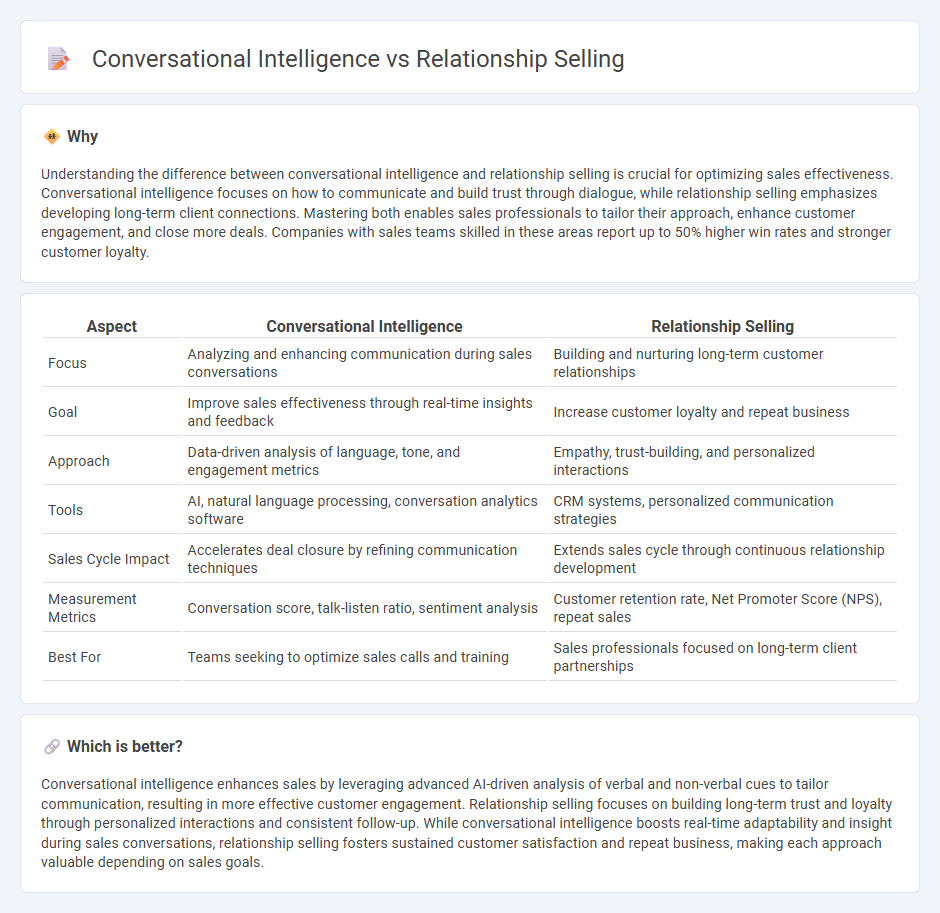
Conversational intelligence enhances sales effectiveness by leveraging real-time data and communication analysis to tailor customer interactions, leading to improved engagement and trust-building. Relationship selling focuses on long-term client connections, emphasizing personalized service and rapport to drive repeat business and customer loyalty. Discover how integrating conversational intelligence with relationship selling strategies can transform your sales outcomes.
Why it is important
Understanding the difference between conversational intelligence and relationship selling is crucial for optimizing sales effectiveness. Conversational intelligence focuses on how to communicate and build trust through dialogue, while relationship selling emphasizes developing long-term client connections. Mastering both enables sales professionals to tailor their approach, enhance customer engagement, and close more deals. Companies with sales teams skilled in these areas report up to 50% higher win rates and stronger customer loyalty.
Comparison Table
| Aspect | Conversational Intelligence | Relationship Selling |
|---|---|---|
| Focus | Analyzing and enhancing communication during sales conversations | Building and nurturing long-term customer relationships |
| Goal | Improve sales effectiveness through real-time insights and feedback | Increase customer loyalty and repeat business |
| Approach | Data-driven analysis of language, tone, and engagement metrics | Empathy, trust-building, and personalized interactions |
| Tools | AI, natural language processing, conversation analytics software | CRM systems, personalized communication strategies |
| Sales Cycle Impact | Accelerates deal closure by refining communication techniques | Extends sales cycle through continuous relationship development |
| Measurement Metrics | Conversation score, talk-listen ratio, sentiment analysis | Customer retention rate, Net Promoter Score (NPS), repeat sales |
| Best For | Teams seeking to optimize sales calls and training | Sales professionals focused on long-term client partnerships |
Which is better?
Conversational intelligence enhances sales by leveraging advanced AI-driven analysis of verbal and non-verbal cues to tailor communication, resulting in more effective customer engagement. Relationship selling focuses on building long-term trust and loyalty through personalized interactions and consistent follow-up. While conversational intelligence boosts real-time adaptability and insight during sales conversations, relationship selling fosters sustained customer satisfaction and repeat business, making each approach valuable depending on sales goals.
Connection
Conversational intelligence enhances relationship selling by enabling sales professionals to understand and interpret customer emotions, needs, and communication styles, fostering trust and rapport. This emotional insight leads to more personalized interactions and stronger client relationships, which drive higher sales performance. Integrating conversational intelligence tools captures real-time dialogue data, empowering sales teams to tailor strategies that deepen customer connections and improve closing rates.
Key Terms
Relationship Selling:
Relationship selling emphasizes building long-term trust and rapport with customers by understanding their needs and delivering personalized solutions. This approach prioritizes empathy, active listening, and consistent engagement to foster loyalty and repeat business. Discover how mastering relationship selling techniques can transform your sales strategy.
Trust-building
Relationship selling emphasizes building long-term trust through consistent, personalized interactions and understanding customer needs deeply. Conversational intelligence enhances trust-building by analyzing communication patterns to improve empathy, transparency, and collaboration in conversations. Discover how integrating these approaches can elevate trust and strengthen client relationships.
Customer loyalty
Relationship selling emphasizes building long-term trust and emotional connections with customers, directly enhancing customer loyalty through personalized interactions. Conversational intelligence leverages communication techniques and data-driven insights to understand customer needs deeply, fostering loyalty by improving engagement quality and responsiveness. Explore how integrating relationship selling with conversational intelligence can significantly boost customer retention and loyalty.
Source and External Links
Relationship Selling: 13 Tips to Sell Better and Close More Sales - Relationship selling is a sales technique that prioritizes building a meaningful connection with the customer by providing value, understanding their challenges and goals, and offering tailored advice, aiming for a win-win solution and ongoing value even after the sale closes.
Relationship selling: Why it pays off to be human in sales - Relationship selling focuses on building long-term partnerships through human-to-human engagement, active listening, and maintaining ongoing dialogue, positioning the salesperson as a trusted adviser rather than just a vendor.
Relationship selling process and techniques | A complete guide - Effective relationship selling techniques include genuine interest in the buyer, honesty, establishing trust through transparent communication, and focusing on client passions to foster deeper, personalized connections.
 dowidth.com
dowidth.com